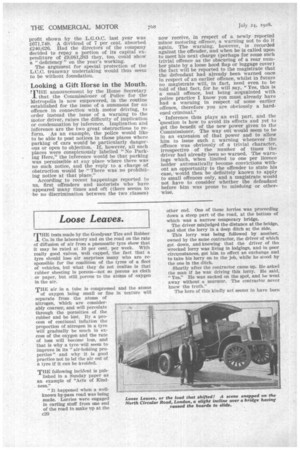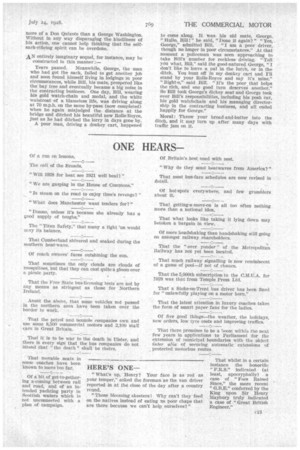Loose Leaves.
Page 42

Page 43

If you've noticed an error in this article please click here to report it so we can fix it.
THE tests made by the Goodyear Tire and Rubber Co. in the laboratory and on the road on the rate of diffusion of air from a pneumatic tyre show that it may be rated at 10 per cent, per week. With really good valves, well capped, •the fact that a tyre should lose air surprises many who are responsible for the condition of the tyres of a fleet of vehicles, but what they do not realize is that rubber sheeting is porous—not so porous as cloth or paper, but still_porous to the atoms of oxygen in the air.
THE air in a tube is compressed and the atoms
of oxygen being small or fine in texture will separate from the atoms of nitrogen, which are considerably coarser, and will percolate through the porosities of the rubber and be lost. By a process of continual inflation the proportion of nitrogen in a tyre will gradually be much in excess of the oxygen and the rate of lass will become less, and that is why a tyre-will seem to improve in its "air-holding properties" and why it is good practice not to let the air out of a tyre if it can be avoided.
THE following incident is published in a Sunday paper as an example of "Acts of Kindness."
"It happened when a wellknown by-pass road was being made. Lorries were engaged in carting stuff from one end of the road to make up at the c20 other end. One of these lorries was proceeding down a steep part of the road, at the bottom of which was a narrow temporary bridge.
The driver misjudged the distance at the bridge, and shot the lorry in a deep ditch at the side.
This lorry was being followed by another. owned by the same contractor, the driver of which got down, and knowing that the driver of the wrecked lorry was living in lodgings, and in poor circumstances, got him to effect an exchange and to take his lorry on to the job, while he stood by the one in the ditch.
Shortly after the contractor came up. He asked the man if he was driving this lorry. He said, " Yes." He was sacked on the spot, and lie went away without a murmur. The contractor never knew the truth."
The hero of this kindly act seems to have been more of a Don Quixote than a George Washington. Without in any way disparaging the kindliness of his action, one cannot help thinking that the selfsack-rifieing spirit can be overdone.
AN entirely imaginary sequel, for instance, may be constructed in this manner :— Years passed. Meanwhile, George, the man who had got the sack, failed to get another job and soon found himself living in lodgings in poor circumstances, while Bill, his mate, prospered like the bay tree and eventually became a big noise in the contracting business. One day, Bill, wearing his gold watch-chain and medal, and the white waistcoat of a blameless life, was driving along at 70 m.p.h. on the same by-pass (now completed) when he again misjudged the distance at the bridge and ditched his beautiful new Rolls-Royce, just as he had ditched the lorry in days gone by.
A poor man, driving a donkey cart, happened to come along. It was his old mate, George. "Hullo, Bill I" he said, "Done it again?" "Yes, George," admitted Bill. "I am a poor driver, though no longer in poor circumstances." At that moment a policeman was seen approaching to take Bill's number for reckless driving. "Tell you what, Bill," said the good-natured George, "I don't like to leave a pal in the lurch, or in the ditch. You buzz off in my donkey cart and I'll stand by your Rolls-Royce and say it's mine." "Right-o," said Bill. "It's the poor, that helps the rich, and one good turn deserves another." So Bill took George's dickey seat and George took over Bill's responsibilities, including his posh car, his gold watchchain and his managing directorship in the contracting business, and all ended happily for George."
Moral: Throw your bread-and-butter into the ditch, and it may turn up after many days with traffic jam on it.












































































































